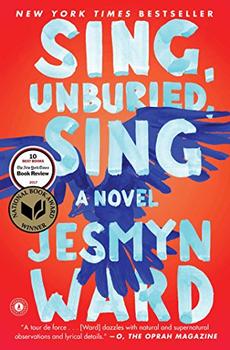Summary | Excerpt | Reading Guide | Reviews | Beyond the Book | Readalikes | Genres & Themes | Author Bio

"That looks disgusting."
She'd wiped her tears from her fight with Michael, but I could still see tracks across her face, dried glossy, from where they'd fallen.
"Pop eat them like this."
"You got to do everything Pop do?"
I shook my head because it seemed like what she expected from me. But I liked most of the things Pop did, liked the way he stood when he spoke, like the way he combed his hair back straight from his face and slicked it down so he looked like an Indian in the books we read in school on the Choctaw and Creek, liked the way he let me sit in his lap and drive his tractor around the back, liked the way he ate, even, fast and neat, liked the stories he told me before I went to sleep. When I was nine, Pop was good at everything.
"You sure act like it."
Instead of answering, I swallowed hard. The potatoes were salty and thick, the mayonnaise and ketchup spread too thin, so the potatoes stuck in my throat a little bit.
"Even that sounds gross," Leonie said. She dropped her cigarette into the can and pushed it across the table to me where I stood eating. "Throw that away."
She walked out the kitchen into the living room and picked up one of Michael's baseball caps that he'd left on the sofa, before pulling it low over her face.
"I'll be back," she said.
Sandwich in hand, I trotted after her. The door slammed and I pushed through it. You going to leave me here by myself? I wanted to ask her, but the sandwich was a ball in my throat, lodged on the panic bubbling up from my stomach; I'd never been home alone.
"Mama and Pop be home soon," she said as she slammed her car door. She drove a low maroon Chevy Malibu that Pop and Mam had bought her when she'd graduated from high school. Leonie pulled out the driveway, one hand out the window to catch the air or wave, I couldn't tell which, and she was gone.
Something about being alone in the too-quiet house scared me, so I sat on the porch for a minute, but then I heard a man singing, singing in a high voice that sounded all wrong, singing the same words over and over. "Oh Stag-o-lee, why can't you be true?" It was Stag, Pop's oldest brother, with a long walking stick in hand. His clothes looked hard and oily, and he swung that stick like an axe. Whenever I saw him, I couldn't never make out any sense to anything he said; it was like he was speaking a foreign language, even though I knew he was speaking English: he walked all over Bois Sauvage every day, singing, swinging a stick. Walked upright like Pop, proud like Pop. Had the same nose Pop had. But everything else about him was nothing like Pop, was like Pop had been wrung out like a wet rag and then dried up in the wrong shape. That was Stag. I'd asked Mam once what was wrong with him, why he always smelled like armadillo, and she had frowned and said: He sick in the head, Jojo. And then: Don't ask Pop about this.
I didn't want him to see me, so I jumped off and ran around the back to the woods. There was comfort in that, in hearing the pigs snuffle and the goats tear and eat, in seeing the chickens peck and scratch. I didn't feel so small or alone. I squatted in the grass, watching them, thinking I could almost hear them talk to me, that I could hear them communicate. Sometimes when I looked at the fat pig with splashed black spots on his side, he'd grunt and flap his ears, and I'd think he meant to say: Scratch here, boy. When the goats licked my hand and head-butted me while nibbling at my fingers and bleated, I heard: The salt is so sharp and good—more salt. When the horse Pop keeps bowed his head and shimmied and bucked so that his sides gleamed like wet red Mississippi mud, I understood: I could leap over your head, boy, and oh I would run and run and you would never see anything more than that. I could make you shake. But it scared me to understand them, to hear them. Because Stag did that, too; Stag stood in the middle of the street sometimes and had whole conversations with Casper, the shaggy black neighborhood dog.
Excerpted from Sing, Unburied, Sing by Jesmyn Ward. Copyright © 2017 by Jesmyn Ward. Excerpted by permission of Scribner. All rights reserved. No part of this excerpt may be reproduced or reprinted without permission in writing from the publisher.
It is a fact of life that any discourse...will always please if it is five minutes shorter than people expect
Click Here to find out who said this, as well as discovering other famous literary quotes!
Your guide toexceptional books
BookBrowse seeks out and recommends the best in contemporary fiction and nonfiction—books that not only engage and entertain but also deepen our understanding of ourselves and the world around us.